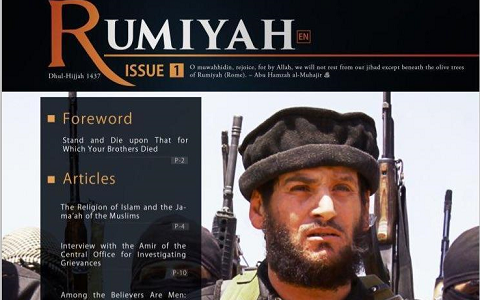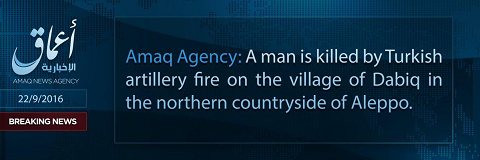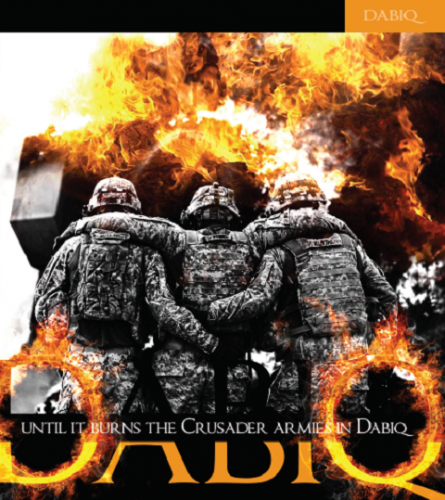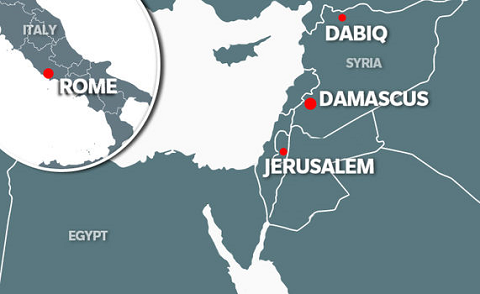NEWS FOCUS: Game over for ISIS recruiters, predict US analysts
by - 12th October 2016

ISLAMIC STATE (ISIS) has relied on a saying of the Prophet Muhammad to recruit its impressionable young idealists to kill for God.
But that prophecy could fail any day now, as alliance forces close in on the so-called ‘caliphate’.
Prophet Muhammad is believed to have stated that the first great battle of the Islamic end times would come when Western forces attacked - and were defeated – at a small town in northern Syria called Dabiq.
That should be any day now, according to ISIS' Amaq News Agency. It issued a statement at the end of September that Turkish fire had killed a man in Dabiq, northern Syria, signalling the beginning of the end.

The trouble is, current reports indicate that allied troops are within a few days of capturing Dabiq, thus disproving the prophecy.
ISIS’ English-language propaganda magazine is named Dabiq after the prophecy.
Every issue of the magazine prominently quotes the claim of its founder, Abu-Mus’ab al-Zarqawi: ‘The spark has been lit here in Iraq, and its heat will continue to intensify . . . until it burns the crusader armies in Dabiq.’

Zarqawi, who founded the group as a branch of Al Qaeda and was rebuked by bin Laden for excessive violence, died in June in a US airstrike.
He based his statement on a hadith or saying of the Prophet found in the highly regarded Sahih Muslim collection, which means Muslims must heed it.
It says: ‘The Last Hour would not come until the Romans would land at al-A'maq or in Dabiq. An army consisting of the best (soldiers) of the people of the earth at that time will come from Medina (to counteract them).’
Rome
Unfortunately for ISIS, their proto-state has been shrinking, forcing them to publish a new English-language magazine with a different title - Rumiyah or Rome..
This time, the magazine quotes Abu Hamzah al-Muhajir, who succeeded al-Zarqawi in the summer.
According to him, the destination of the end-times battle has shifted to Rome: ‘O muwahhidin, rejoice, for by Allah, we will not rest from our jihad except beneath the olive trees of Rumiyah (Rome).’
Rodger Shanrahan, a Fellow of Australia’s prestigious Lowy Institute and expert on religious violence says the shift is logical.
‘ISIS has possibly decided that naming your social media magazine after a town that will likely soon fall out of your control would not be a good look going forward.’
He said that re-naming the publication after the centre of Christendom was a way to show what they aspired to, rather than what they had lost.
Prophecy

US military and defence experts believe the Obama government could do more to capitalize on the religious theme, but is afraid to do so.
Daveed Gartenstein-Ross, senior fellow at the Foundation for Defence of Democracies told Lapido ISIS had 'anchored its rise and legitimacy to specific aspects of Islamic prophecy.'
'When its interpretation of this prophecy does not match reality, that will pose significant challenges for the organization - perhaps even existential challenges, if the group's opponents play their cards right,' he added.
Whether the US government could capitalize on that was a separate question.
'The US shies away from messaging that touches on religious themes, and generally does not regard itself as a credible voice in this regard’ he said.
NEED TO KNOW
End-times prophecies have an unfortunate habit of failing.
In Chicago, housewife Dorothy Martin persuaded her small group of followers that she had received a revelation from a planet named Clarion announcing the end of the world ina great flood on December 21, 1954.
The earth failed to be devastated, despite her followers selling up and moving to a mountaintop to await the end – but it did trigger a research programme into ‘cognitive dissonance.’
Martin’s small group could not accept their leader’s error, and instead went on a recruitment spree, according to expert Leon Festinger.
Others like the Millerites in 1843 recalculate the date, and hope again.
Jehovah’s Witnesses who have had to change the date of the Second Coming of Christ at least five times (in 1914, 1915, 1918, 1925, and 1975) are either abandoning the teaching, or spiritualizing the date.
The Japanese sect Ichigen no Miya, ‘internalized’ the suffering its founder had predicted: He attempted to commit seppuku, but his followers intervened.
He told them later: ‘I could see my own body as if it belonged to somebody else. I thought that I had managed to get out of my body at last, and I was greatly surprised to find that my body had changed itself into the islands of Japan and that a fire had broken out at its centre.
‘Then I knew that God had transferred the cataclysm to my own body. I thanked God and felt a bliss I had never experienced before.’
* The hadith on which ISIS bases its claim actually says: ‘The Hour will not be established until the Romans land at al-A’maq or Dabiq’ (Sahih Muslim Book Pertaining to the Turmoil and Portents of the Last Hour - Kitab Al-Fitanwa Ashrat As-Sa`ah).
